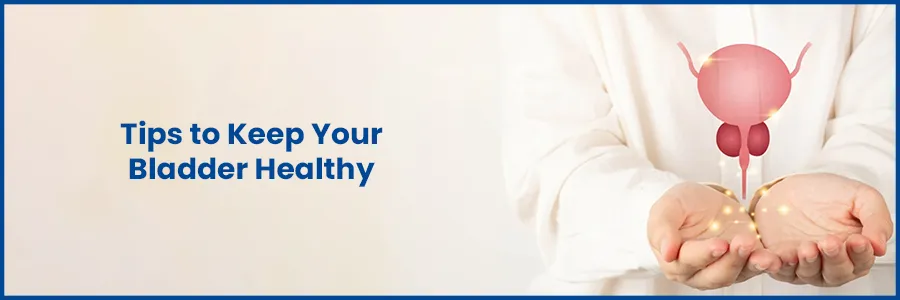- Cardiology 84
- Dermatology 45
- Endocrinology 33
- ENT 16
- Fertility 190
- Gastroenterology 78
- General-Medicine 81
- Gynecology 80
- Hematology 19
- Infectious-Diseases 33
- Neurology 52
- Oncology 34
- Ophthalmology 23
- Orthopedics 69
- Pediatrics 31
- Procedure 23
- Public-Health 144
- Pulmonology 59
- Radiology 8
- Urology 68
- Wellness 161
- Woman-and-child 77

Tips to Keep Your Bladder Healthy
Our bodies are complex networks, with each organ playing a crucial role in overall health and well-being. One often-overlooked organ is the bladder. A healthy bladder is essential for a comfortable, uninterrupted daily life. Here are some tips on how to improve bladder health and maintain optimal function:
Stay Hydrated, but Don't Overdo It:
Proper hydration is vital for maintaining a healthy bladder. Adequate water intake helps remove toxins and bacteria that may cause infections. However, excessive fluid intake, especially close to bedtime, can lead to frequent nighttime bathroom trips, disrupting your sleep. Aim for balanced hydration throughout the day.
Practice Good Bathroom Habits:
Respond to your body's signals and avoid delaying restroom visits. Holding urine for too long can stretch the bladder and weaken its muscles. Ensure you fully empty your bladder to prevent lingering bacteria.
Maintain a Healthy Weight:
Extra weight can put pressure on the bladder, leading to stress and urinary incontinence. Regular physical activity and a balanced diet support weight management and promote overall bladder well-being.
Choose Bladder-Friendly Foods:
Some foods and beverages can irritate the bladder lining, causing discomfort or urinary symptoms. Common triggers include caffeine, alcohol, spicy foods, and artificial sweeteners. Pay attention to your bladder's reaction to different foods and adjust your diet as needed.
Practise Pelvic Floor Exercises:
Strong pelvic floor muscles support the bladder and help control urinary function. Kegel exercises are simple yet effective for maintaining pelvic floor strength. Regular practice can prevent bladder leakage and improve control.
Avoid Smoking:
Smoking can irritate the bladder and increase the risk of bladder cancer. The harmful chemicals in cigarettes directly affect the bladder lining. Quitting smoking is a crucial step in maintaining bladder health.
Proper Hygiene Matters:
Good hygiene practices can prevent urinary tract infections (UTIs). Wipe front to back after using the toilet and choose cotton underwear that allows your skin to breathe. This reduces the likelihood of bacterial growth in the urinary tract.
Manage Chronic Conditions:
Conditions like diabetes and obesity can impact bladder health. Proper management through medication, lifestyle changes, and regular check-ups can prevent complications affecting the bladder.
Limit Alcohol and Caffeine Intake:
Both alcohol and caffeine act as diuretics, increasing urine production and potentially irritating the bladder. Moderating consumption can help reduce excessive bladder activity.
Stay Informed and Get Regular Check-ups:
Be aware of any changes in bladder habits, such as frequent urination, pain, or blood in the urine. Consult a healthcare professional if you notice persistent issues. Regular check-ups can catch potential problems early and ensure prompt treatment.
Trusted Urologists at Medicover Hospital
At Medicover Hospitals, our skilled urologists are available to address various bladder-related concerns. For details about urology specialists who focus on bladder health, visit the Medicover Hospitals website.
Conclusion:
Caring for your bladder health is a proactive step toward maintaining overall quality of life. By following these tips and adopting healthy habits, you can prevent common bladder-related problems and enjoy a comfortable, active lifestyle. Remember, minor adjustments can lead to significant improvements in your bladder well-being.
Ready to take control of your health journey? Book your appointment now and start your path towards wellness today!
Book an AppointmentFrequently Asked Questions
The bladder is a muscular structure responsible for storing urine until it is released from the body. It plays a crucial role in maintaining urinary function and overall bodily comfort.
Signs of an unhealthy bladder include frequent urination, urgency, pain or discomfort during urination, incontinence (loss of bladder control), and blood in the urine.
To maintain bladder health, stay hydrated, practice good bathroom habits, maintain a healthy weight, consume bladder-friendly foods, engage in pelvic floor exercises, avoid smoking, manage chronic conditions, and limit alcohol and caffeine intake.
Yes, alcohol and caffeine are diuretics that can increase urine production and potentially irritate the bladder. While eliminating them isn't necessary, moderating their intake can help prevent overactivity of the bladder.
Kegel exercises involve contracting and relaxing the pelvic floor muscles. They help strengthen these muscles, which in turn supports bladder control and prevents leakage.
Excess weight can put pressure on the bladder and lead to issues like stress urinary incontinence. Maintaining a healthy weight through diet and exercise can promote better bladder health.
Yes, chronic conditions like diabetes and obesity can affect bladder function. Proper management of these conditions is important to maintain bladder health and prevent complications.
Wiping from front to back after using the toilet, wearing breathable cotton underwear, and staying well-hydrated can help prevent urinary tract infections (UTIs).

- Cardiology 2132
- Dermatology 168
- Endocrinology 135
- ENT 97
- Fertility 217
- Gastroenterology 232
- General 478
- General-Medicine 1685
- Gynecology 169
- Hematology 85
- Infectious-Diseases 208
- Neurology 207
- Oncology 345
- Ophthalmology 65
- Orthopedics 187
- Pediatrics 83
- Procedure 72
- Public-Health 209
- Pulmonology 126
- Radiology 13
- Second Opinion 311
- Urology 294
- Wellness 600
- Woman-and-child 447
- Others 10217
Related Blogs
If you have any questions, please fill out the enquiry form or call us, and we will get back to you promptly.
040-68334455